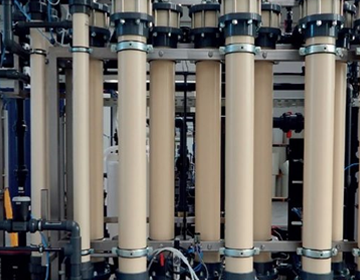Nanofiltration systems are used for the removal contaminants from water sources, and are commonly used for desalination. Nanofiltration (NF) is a cross-flow filtration technology that falls between ultrafiltration (UF) and reverse osmosis (RO). The membrane has about a 1 nanometre nominal pore size. Nano filter membranes are usually rated by molecular weight cut-off (MWCO) instead of nominal pore size.

Nanofiltration (NF membrane) functions similarly to reverse osmosis or RO membrane, but is generally targeted to remove only divalent and larger ions. Monovalent ions such as sodium and chloride will pass through an NF or Nano filtration membrane, therefore many of its uses involve de-salting of the process stream. In the production of lactose from cheese whey, for example, NF filtration system concentrates lactose molecules while passing out salts, a procedure that purifies and concentrates the lactose stream. In water treatment, NF membranes are used as a softening membranes for hardness removal (in place of water softeners), pesticide elimination, and color reduction. It can also be used to reclaim spent Sodium Hydroxide NaOH solutions, in which case the permeate stream is purified NaOH, allowing reuse many times over.